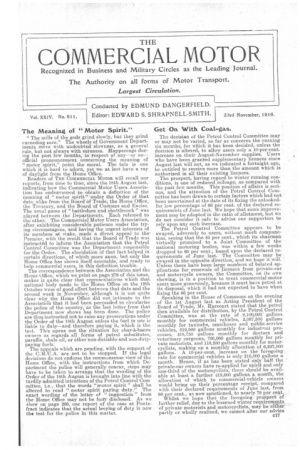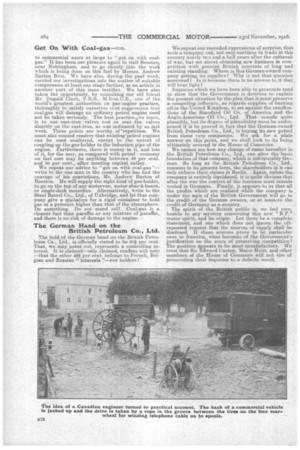The Meaning of "Motor Spirit."
Page 1

Page 2

If you've noticed an error in this article please click here to report it so we can fix it.
"The mills of the gods grind slowly, but they grind exceeding sure." The wheels of Government Departments move with undoubted slowness, as a .general rule, but not always with sureness. Happenings during the past few months, in respect of any—or no— official pronouncement concerning the meaning of " motor spirit," point the moral. The tale is one which it is hard to adorn, yet we at last have a ray of daylight from the Horne Office.
Readers of THE COMMERCIAL MOTOR will recall our reports, from time to time, since the 18th August last, indicating how the Commercial Motor Users Association has endeavoured to obtain a definition of the meaning of "motor spirit" under the Order of that date, alike from the Board of Trade, the Home Office, the Treasury, and the Board of Customs and Excise. The usual game of "battledore and shuttlecock" was played between the Departments. Each referred to the other. The Commercial Motor Users Association, after exhibiting considerable patience under the trying circumstances, and having the urgent interests of its members at stake, made a direct appeal to the Premier, with the result that the Board of Trade was instructed to inform the Association that the Petrol Control Committee was the Department responsible for the Order. The elucidation of that fact helped in certain directions, of which more anon, but only the Home Office has shown itself amenable, and ready to help commercial users, in this definition_ trouble. .
The correspondence between the Association and the Home Office, which we print on page 279 of this issue, makes it quite clear that representations which that national body made to the Home 'Office on the 12th October were of good effect between that date and the second week in November, although it is not quite clear why the Home Office did not intimate to the Association that it had been persuaded to circularize the police of the country, as the last letter from that Department now shows has been done. The police are thus instructed not to raise any prosecutions under the Order of the 18th August unless the fuel in use is liable to duty—and therefore paying it, which is the test. This opens out the situation for char-h-bancs owners as regards all forms of petrol substitutes, paraffin, shale oil, or other non-dutiable and non-dutypaying fuels.
The appeals which are pending with the support of the C.M.U.A. are not to be stopped. If the legal decisions do not endorse the commonsense view of the Home Office, with the instructions from which Department the police will generally concur, stops may have to he taken to arrange that the wording of the Order of the 18th August is brought into line with the tardily-admitted intentions of the Petrol Control Corn mittee. i.e., that the words "[motor spirit" shall he altered to read "motor spirit paying duty." The exact wording of the letter of suggestion" from the Home Office may not be fully disclosed. As we show on page 269, one report of the case at Pontefract indicates that the actual levying of duty is now the test for the police in this matter.
Get On With Coal-gas.
The decision of the Petrol Control Committee may or may not be varied, so far as concerns the ensuing six months, for which it has been decided, unless the decision is altered, to allow users only a 10-per-cent. increase on their August-November supplies. Users who have been granted supplementary licences since August last will not, as we indicated a fortnight ago, be entitled to receive more than the amount which is authorized in all their existing licences.
The prospect, having regard to winter running conditions, is one of reduced mileage, as compared with the past few months. This position of affairs is serious, and the attention of the Petrol Control Committee has been drawn-to certain factors which had not been ascertained at the date of its fixing the unlookedfor low percentage of 66 per cent, of the declared requirements of June last. We hope that some improvement may be adopted in the ratio of allotment, but we do not consider it safe to advise our supporters to rely upon any such increase.
The Petrol Control Committee appears to be swayed, adversely to users, without much compunction, seeing that the 85 per cent., which its chairman virtually promised to a Joint Committee of the national motoring bodies, was within a few weeks dropped to 66 per cent., based upon the declared requirements of June last. The Committee may be swayed in the opposite direction, and we hope it will. Unless there have been large numbers of belated applications for renewals of licences from private-car and motorcycle owners, the Committee, on its own showing, is in a position to treat commercial-motor users more generously, because it must have petrol at its disposal, which it had not expected to have when fixing the 66 per cent. Speaking in the House of Commons on the evening of the 1st August last as Acting President of the Board of Trade, Mr. Harcourt stated that the petrol then available for distribution by the Petrol Control . Committee, was at the rate of 2,100,000' gallons monthly for commercial vehicles, 2,087,500 gallons monthly for taxicabs, omnibuses and public service vehicles, 812,500 gallons monthly for industrial processes, 418,750 gallons monthly for doctors and Veterinary surgeons, 700,000 gallons monthly for private motorists, and 118,250 gallons monthly for motorcyclists, making up a monthly allocation of 6,237,000 gallons. A 10-per-cent. increase on the foregoing rate for commercial vehicles is only 210,000 gallons a month. Hence, if as has been stated only half the private-car owners have re-applied for spirit and only one-third of the motorcyclists, there should be available at least a further 415,000 gallons a month, the allocation of which to commercial-vehicle owners would bring up their percentage receipt, compared with their declared requirements of June last, from 66 per cent., as now sanctioned, to nearly 78 per cent.
Whilst we hope that the foregoing prospect of further relief, due to the lessened winter requirements of private motorists -and motorcyclists may be either partly or wholly realized, we cannot alter opr advice to commercial users at large to "get on with coal gas!' It has been our pleasure again to visit Beeston, near Nottingham, and to go closely into the work which is being done on. this fuel by Messrs. Andrew Barton Bros. We have also, during. the past week, carried our investigations into the matter of suitable compressors at least one stage further, as an article in another part of this issue testifies. We have also taken the opportunity, by consulting our old friend Mr. Dugald Clerk, F.E.S., M.Iest.C.E., one of the world's greatest authorities on gas-engine practice, thoroughly to satisfy ourselves ttat suggesuons that coal-gas will damage an ordinary petrol engine need not be taken seriously. The best praetice.twe learn, Is to use cast-iron valves and to seat the valves directly on the cast iron, as was indicated by us last week. These points are worthy of 'repetition. We must also remind readers that existing-petrol engines can be used unaltered, except to the extent of coupling up the gas-holder to the induction pipe of the engine. Furthermore, there is money in it, and lots of it, for the user, as compared with petrol: economy on fuel cost may be anything between 40 per cent. and 80 per cent., after meeting capital outlay.
We repeat our advice to " get on with coal-gas "write to the one man in the country who has had the courage of his convictions, Mr. Andrew Barton of Beeston. He will supply the right kind of gas-holder, to go on the top of any motorvan, motor char-h-banes, or single-deck motorbus. Alternatively, write to the Steel Barrel Co., Ltd., of Uxbridge, and It that company give a quotation for a rigid container to hold gas at a pressure higher than that of the atmosphere. Do something. Do not stand still. Coal-gas is a cleaner fuel than paraffin or any mixture of paraffin, and there is no risk of damage to the engine..
The German Hand on the
British Petroleum Co., Ltd.
The hold of the German hand on the British Petroleum Co., Ltd., is officially stated to be 50A per cent. That, we may point out, represents a controlling interest. It ig claimed—only claimed, readers will note —that the other 49i per cent, belongs to French, Belgian and Russian -c` interests "—not holders I We repeat our recorded expressions of surprise, that such a, company can, not only continue to trade in this country nearly two and a half years after the outbreak of war, but set about obtaining new business in competition with genuine British interests of long and existing standing. Where is this German-owned company getting its supplies ? Why is not that question answered? Is it because there is no answer to it that will bear light?
Inquiries which we have been able to prosecute tend to show that the Government is desirous to explain the present situation by the plea that it must preserve a competing influence, as regards supplies of burning oil in the United Kingdom, to set against the ramifications of the Standard Oil Co. of America and the Anglo-American Oil Co., Ltd.That sounds quite plausible, but its degree of plausibility must be undermined if it be proved in fact that the German-owned British Petroleum Co., Ltd., is buying its new petrol from those very companies. We ask for a plain answer on this point, and we shall leek to its being ultimately secured in the House of Commons. We cannot see how any change of name hereafter in the British Petroleum Co., Ltd., can alter the basic foundation of that company, which is indisputably Geeman. So long as the British Petroleum Co., Ltd., remains in its present form, the shareholders in it can only enforce their claims in Berlin. Again, unless the company is entirely liquidated, it is quite obvious that after the war the control of the business must remain vested in Germans. Finally, it appears to us that all the profits which are realized while the comPany is under the wgis of the British Government will go to the credit of the German owners, or at least-to the credit of Germany as a country. The spirit of the British public is, we feel sure, hostile to any mystery concerning this new " motor spirit, and its origin. Let there be a complete statement, and one which does not ignore the oftrepeated request that the sources of supply shall he disclosed. Ifthose sources prove to be particular ones in America, what becomes of the Government's justification on the score of preserving competition ? The position appears to be most unsatisfactory. We trust that Sir Edward Carson, Major Hunt, and other members of the House of Commons will not tire of prosecuting their inquiries to a definite result.
























